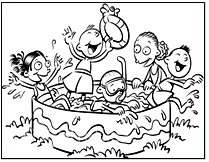阅读理解。
Once in a Lifetime Twice As Good
I can already hear firecrackers in the distance as the New Year begins. It is time to celebrate 2005.
This is a brand new year for those of us who follow the Western calendar. Of course, according to the
lunar calendar, the firecrackers will not sound for the New Year until February when the year of Rooster
(公鸡) officially begins. I feel lucky to live in Shanghai because I can celebrate two different New Years.
I am looking forward to learning about the traditions of Chinese New Year.
At home in Canada, everyone in my family writes down their predictions (预言) for the next year.
Then we hide them away for an entire (完整的) year (no peeking!) and read them on New Year's Day.
I didn't predict that I would be living in Shanghai, China this year and if I had, I would never have predicted
that I would be enjoying life here so much. (Better luck next year with my predictions!)
I think I'll play it safe this year and predict that many new buildings will go up in my neighbourhood in
Gubei! That is a prediction that is sure to come true, here in the fastest-growing city in the world! Another
tradition at the New Year is writing down all those resolutions (决心). So here I go! I have some plans for
the New Year that I intended (打算) to keep. For example, I plan to work much harder on learning Chinese.
It is not an easy language, but living here gives me a once in a lifetime opportunity to really learn it. So, I
plan to apply myself, yes I do.
I will use a new Chinese phrase every day when I am out in the city. My second resolution is to get rid
of the habit of procrastination (拖延)! I am one of those people who always leave things to the last minute
and that has got to change! No more staying up late to finish my homework at the last minute.
Let's not call it procrastination in China, but a month's grace period on New Year' resolutions. Whatever,
Happy 2005!
1. The year of Rooster begins ______.
A. on January 1st
B. in February of the western calendar
C. on the Chinese New Year's Eve
D. on the first day of the Western calendar
2. The writer is ______.
A. a Chinese student in Canada
B. a Canadian student who is now studying in China
C. studying Chinese in Canada
D. from Canada and now working in China
3. Which of the following is NOT true?
A. The writer believes that Shanghai is developing fastest in the world.
B. The writer lives in Gubei, a neighbourhood in Shanghai.
C. The writer is sure there will.
D. The writer expects a much.
4. Which of the following is true?
A. The writer did not write down her resolutions.
B. The writer intended not to keep her plans.
C. The writer was determined to learn Chinese well.
D. The writer thinks Chinese is easy to learn.
5. The writer used to ______.
A. use a new Chinese phrase every day
B. use her time very wisely
C. change her habit of procrastination
D. leave things to the last minute


 re you in college at such a young age?” I asked jokingly.
re you in college at such a young age?” I asked jokingly. ted to realize her dream
ted to realize her dream . The more you laugh, the younger you will be.
. The more you laugh, the younger you will be.